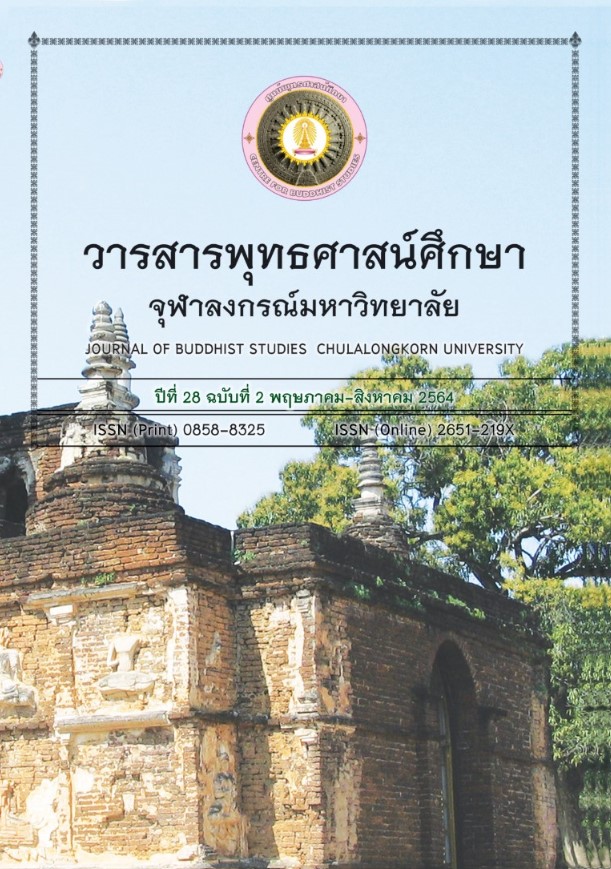The Scenario of Administration of Research Centers for Buddhist Studies in Asia
Keywords:
Prospect, Administration, Research Centers for Buddhist Studies, AsiaAbstract
This research seeks to study the administrative prospects of Buddhist Studies research centers in Asia by applying the Ethnographic Delphi Futures Research (EDFR) technique. Purposive sampling is used to select 21 expert informants from 8 countries. Devices for data collection are unstructured interview forms and opinionnaires. Median and Mode in descriptive statistics, and Interquartile Range are used as data analysis tools.
The research finds that there are 12 main factors and 80 important issues to consider regarding the administrative prospects of Buddhist Studies research centers in Asia. They include the research centers’ 1) philosophy; 2) visions, goals and objectives; 3) contexts; 4) budget; 5) personnel; 6) managerial resources; 7) general management; 8) research trends; 9) research information; 10) research publications; 11) research outcomes; and 12) external and internal evaluations.
Downloads
References
Gary Dessler. (1985). Management Fundamentals: Modern principles and practices. Virginia: Reston Publishing.
Samuel C. Certo & S.Trevis Certo. (2012) Modern Management Concepts and Skills (12th ed). Kendallville: Pearson Education.
จุมพล พูลภัทรชีวิน. (2551). การวิจัยอนาคต (Futures Research). วารสารสมาคม นักวิจัย, 13(2), 12.
พัชราภรณ์ ดวงชื่น. (2561). เปลี่ยนมุมมองการบริหารองค์กรการศึกษาในโลก Disruptive. วารสารบริหารการศึกษา มหาวิทยาลัยศิลปากร, 8(2), 251-255.
พระมหาพงศ์ศักดิ์ ฐานิโย. (2559). การวิจัยเชิงคัมภีร์: กรณีศึกษาธัมมจักกัปปวัตร สูตร. วารสารธรรมธารา, 2(1), 5.
พระมหาสมชาย ฐานวุฑฺโฒ. (2558). บทบรรณาธิการ. วารสารธรรมธารา, 1(1), 5.
สินธะวา คามดิษฐ์. (2555). 2P4M: แนวทางการส่งเสริมการวิจัยในสถาบัน อุดมศึกษาเอกชน. วารสารสุทธิปริทัศน์. 24(75), 37. สืบค้นจาก https://so05.tci-thaijo.org/index.php/DPUSuthiparithatJournal/article/view/245828
สุทธิวรรณ ตันติรจนาวงศ์. (2560). ทิศทางการจัดการศึกษาในศตวรรษที่ 21. Veridian E-Journal, Silpakorn University. 10(2), 2845.
วิภาพร นิธิปรีชานนท์. (2554). แนวปฏิบัติที่ดีในการบริหารงานวิจัยของสํานักงาน คณะกรรมการการศึกษาขั้นพื้นฐาน (วิทยานิพนธ์ปรัชญาดุษฎีบัณฑิต มหาวิทยาลัยศิลปากร).
อาทิตยา ดวงมณี. (2555). การพัฒนายุทธศาสตร์งานวิจัยโดยการเทียบเคียง สมรรถนะตามเกณฑ์คุณภาพการศึกษาเพื่อการดําเนินการที่เป็นเลิศของ วิทยาลัยพยาบาลสังกัดกระทรวงกลาโหม (วิทยานิพนธ์ปริญญาดุษฎีบัณฑิต จุฬาลงกรณ์มหาวิทยาลัย).
พระมหาพงศ์ศักดิ์ ฐานิโย. (2562). การศึกษาพระพุทธศาสนากับการบริหารงานวิจัย, เอกสารประกอบการสัมมนาการศึกษาพระพุทธศาสนากับการ บริหารงานวิจัย (หน้า 6-13). คณะศึกษาศาสตร์ มหาวิทยาลัยศิลปากร.
Macmillan. Thomas T. (1971). The Delphi Techniques. Paper presented at the annual meeting of the California Junior Colleges Asเsociations Committee on Research and Development Monterrey, California.
Danielle Wartnaby. (2014). Organizational Philosophies: Mission, vision and values Statements, quoted in The Jubilee Centre for Character and Values, Framework for Character Education.Retrieved from http://jubileecentre.ac.uk/userfiles/jubileecentre/pdf/other-centre-papers/Framework..pdf.
DAAD & DIE. (Eds.). (2018). Digital Transformation Higher Education and Research for Sustainable Development (Position Paper. Bonn). Retrieved from https://www.daad.de/en/the-daad/digital-transformation-higher-education-and-research-forsustainable-development/
George A. Giannopoulos. (2017). Strategic Management and Promotion Issues in International Research Cooperation. Case Study on Transport Policy 5, 438-451. Retrieved from https://www.sciencedirect.com
Giancarlo Lauto & Shintaro Sengoku. (2015). Perceived incentives to trans-disciplinarity in a Japanese university research center, 136-137. Retrieved from http://www.sciencedirect.com/science/article/abs/pii/s0016328714001712
Kiyonori Nagasaki & Toru Tomabechi. (2013). Towards a digital research environment for Buddhist Studies. Literary and linguistic Computing. 28(2), 296. Retrieved from http://academic.oup.com2dsh/article-abstract/28/2/296/1037965
Obadan, M.I.. (2010). Economic Globalization for Africa. address at the Southern Africa Economic Summit, sponsored by the World Economic Forum, Harare, Zimbabwe, 2008, quoted in Oseyomon, Ehi Patrick, “Globalization and Management,” African Research Review: Issues and Concepts, 4(4), 97. Retrieved from http://www.afrrevjo.com
Downloads
Published
How to Cite
Issue
Section
License
บทความที่ได้รับการตีพิมพ์เป็นลิขสิทธิ์ของศูนย์พุทธศาสน์ จุฬาลงกรณ์มหาวิทยาลัย
ข้อความที่ปรากฏในบทความแต่ละเรื่องในวารสารวิชาการเล่มนี้เป็นความคิดเห็นส่วนตัวของผู้เขียนแต่ละท่านไม่เกี่ยวข้องกับศูนย์พุทธศาสน์ จุฬาลงกรณ์มหาวิทยาลัย และคณาจารย์ท่านอื่นๆในมหาวิทยาลัยฯ แต่อย่างใด ความรับผิดชอบองค์ประกอบทั้งหมดของบทความแต่ละเรื่องเป็นของผู้เขียนแต่ละท่าน หากมีความผิดพลาดใดๆ ผู้เขียนแต่ละท่านจะรับผิดชอบบทความของตนเองแต่ผู้เดียว






